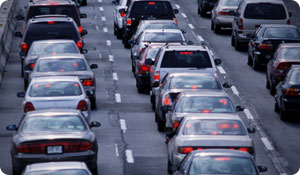
Persistent noise can be an actual health risk, especially if you're in your senior years.
Danish researchers examined the medical records of more than 57,000 people over a period of several years and concluded that people who lived at addresses that were subject to heavy traffic noise and air pollution suffered more strokes than people who resided in quieter locales. The correlation was statistically significant in people at least 64.5 years of age. In general, with every 10-decibel rise in traffic noise, the risk of stroke increased 14 percent. But among older people, the risk of stroke rose 27 percent.
The results weren't surprising to the scientists, who cited a 2006 overview of 61 separate studies investigating the effects of road, air, and rail noise on cardiovascular health. Those studies showed a definite correlation between exposure to transport noise and an increased level of heart disease and high blood pressure, which is a known stroke risk.
When a person is exposed to persistent road noise, the nervous and endocrine systems kick into high gear, causing stress hormones to flood the body and heart rate and blood pressure to rise. The closer a person is to the noise, the higher the risk of having cardiovascular problems. Sleep is also disturbed in high-traffic environments, which can lead to cardiovascular issues.
Short of putting your house up for sale, what can you do if you live in a high-traffic area?
- One solution is to use earplugs whenever possible. That may mean inserting them only at night in order to have undisturbed rest, or it may mean wearing them during the day as well while doing chores or computer work.
- If you want a more permanent solution, consider erecting a barrier wall around your house. Concrete is most effective. Unfortunately, landscaping and vegetation don't work because they're not dense enough to block out noise.
- Insulating windows may help. Look for windows with a high Sound Transmission Class (STC) rating.
- If all else fails, appeal to your local government to lower the speed limit on nearby roads or lay down rubberized asphalt instead of conventional asphalt.
See what people are saying about this article on our Facebook page!![]()
Sources:
http://trafficnoise.org/
American Heart Association, www.newsroom.heart.org
Sorenson M, Hvidberg M, Anderson ZJ, Nordsborg RB, Lillelund KG, Jakobsen J, Tjonneland A, Overvad K, Raaschou-Nielsen O (2011). Road Traffic Noise and Stroke: A Prospective Cohort Study. European Heart Journal, January 25, 2011 (online).





